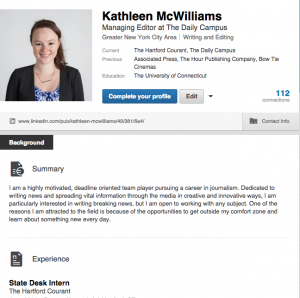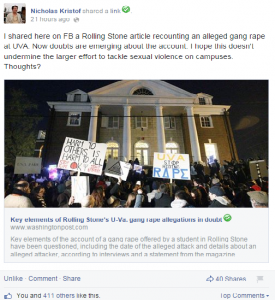
College students are constantly told to monitor their online reputation. It’s a struggle our parent’s generation didn’t have to face. Twitter, Facebook, LinkedIn, Tumblr and even seemingly old-school social media platforms like MySpace didn’t exist and the strings that come attached didn’t either. Arguably, I think that future journalists need to heed their online reputation even more than most careers.
In many ways, the career of a journalist is built upon a good reputation-online or offline. A journalist who is credible presents themselves professionally in all aspects of life, but needs to be especially professional online as the journalistic product becomes increasingly hosted on the web.
As an aspiring journalist, I’ve taken my online reputation very seriously over the past couple of years. I’ve always been careful online, but I realized when I added journalism as a major that I’d need to be even more careful with my online presence. When I Googled myself for this assignment, I was happy to see that there weren’t any “skeletons in the closet” so to speak.
When you Google “Kathleen McWilliams” without any qualifier or advanced search details, all that comes up is my Twitter account, LinkedIn and the work I’ve done at The Daily Campus. For a basic search, that’s a pretty good set of results. My Twitter account is professional, but I do like to follow what Christine Taylor called the “Social media rule of thirds.” Over the summer at one of the intern lunches, Taylor explained that a good Twitter feed for a journalist is 1/3 purely work that is produced by the journalist, 1/3 interesting content that you don’t produce and 1/3 fun. I interpreted fun as PG fun. The last 1/3 of tweets could be about things you did over the weekend, funny but work appropriate jokes or tweets about what you’re interested in. As for LinkedIn and The Daily Campus, those search results reveal purely professional things about me. They hold up my reputation as an individual who works as a journalist and is motivated to find a career.
After further searching, however, I learned that Googling my name with “UConn” in the search as well, brought up significantly more of my social media presence. I found my old about.me page, which is embarrassingly outdated, even if completely professional. I also found my personal website which I created last year kathleenmcwilliams.com, and has yet to see the product of the things I’ve learned in this class.
Of course, other people show up in when you Google “Kathleen McWilliams.” But it’s no one too scary that would be disreputable to my reputation. One is a basketball player in Washington and the others don’t live in the United States, posing zero threat to my credibility.
Being a Conversation Is Part of the Package

When I think about why I wanted to be a journalist my train of thought takes two directions. There’s the fact that I am committed to a life ling education, and journalism allows me to pursue topics I’m interested as well as learn about new ideas. Then there’s the fact that I wanted to tell, share and bring to light stories that hadn’t been told. To me, being a conversation leader starts with sharing a story. As journalists, this is just part of the package and a good journalist should be comfortable starting the conversation. Readers to look to journalists as authorities on the subjects they cover and the more conversations journalists start, the more credible their work will seem.
I think about my journalistic role models. On the larger scale I look up to Christiane Amanpour, Nick Kristof, Brian Stelter (when he was at The New York Times) and Maureen Dowd. All of these journalists are constantly starting conversations with their followers and readers. In a sense, it’s what makes them great journalists. They reach out to their readership and ask them what they think, enabling “regular” people to have conversations about Ferguson, Sexual Assault and the crisis in Washington.
I am not quite a conversation leader yet, but I think that it’s important for a fledgling journalist to think about how to start conversations. I use my Twitter to post what I hope is interesting, relevant and important news and often pose questions, but I don’t often get a lot of engagement. As an editor at The Daily Campus, I constantly have to think about how to get our stories talked about. I’m comfortable with this new role because I think it’s how the news industry will survive. Starting a conversation drives traffic to your work and can only bring more eyes to important news.
However, with this new role, we’ll have to be careful about how we lead conversations. We can’t just start talking about a subject we’re not knowledgeable about. One of the great things about Stelter and Amanpour is that they embrace conversation making on so many levels. On Twitter they post their work, ask questions and encourage engagement, but they also let followers into the process of how they report.Like Gingras and Lehrman say in their article “Online Chaos,” journalists have to promote transparency and credibility that way.
Group of #ICantBreathe protesters just passed by @TimeWarnerCtr (where CNN is based); outside, security for the mall pic.twitter.com/pPCrMkFcuJ
— Brian Stelter (@brianstelter) December 5, 2014